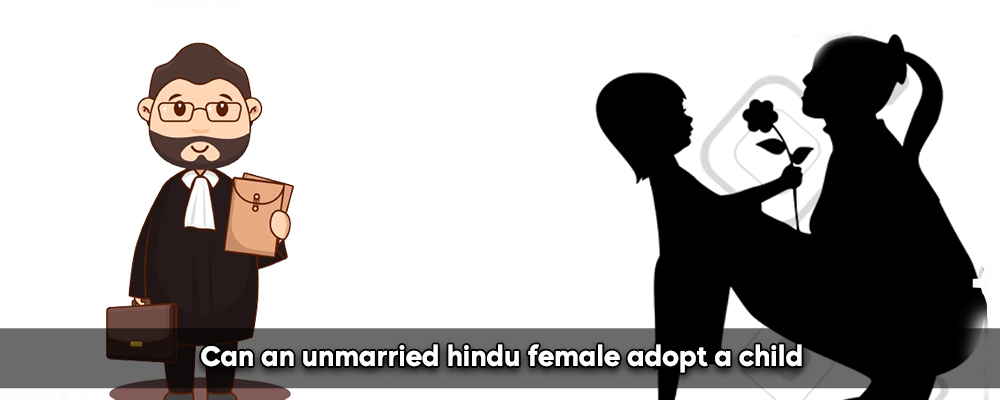Within the ever-changing terrain of family formations, adoption provides a meaningful means by which individuals might encounter the delights of motherhood. But Hindu women who are single frequently wonder if they are qualified to adopt a child.
Legislations Pertaining to Adoption Laws in India
- The Hindu Adoption and Maintenance Act, 1956, primarily governs the legal foundation for adoption in India. Any Hindu woman, regardless of her marital status, is eligible to adopt a child under this act. In the adoption procedure, single Hindu women are treated legally on par with married women.
- Hindu Adoption and Maintenance Act notwithstanding, single Hindu women may also take into consideration the Guardians and Wards Act, of 1890, which confers guardianship rights upon them in lieu of marriage. Although this does not provide the same legal standing as adoption, it does give the guardian control over the welfare and raising of the child.
Need A Legal Advice
The internet is not a lawyer and neither are you. Talk to a real lawyer about your legal issue

Obstacles Unmarried Hindu Women Face in Adoption
- Unmarried Hindu women who want to adopt may face social opposition notwithstanding legal restrictions. The adoption process can be emotionally taxing because of the judgment and disapproval that might result from traditional standards and norms regarding family configurations.
- Assuming a stable and traditional family setting, adoption agencies including birth parents may harbour an unconscious prejudice in favour of married couples. Hindu women who are single may be at a disadvantage during the adoption screening process.
- A prospective parent’s financial situation may be closely examined by certain adoption agencies. Single mothers may come under more scrutiny and have preconceived notions about their capacity to give their children a stable financial situation.
Adoption Rights of Hindu Women Who Are Not Married
- Hindu women who are single are expressly granted the right to adopt by the Hindu Adoption and Maintenance Act. This legislative measure emphasizes the equality principle by acknowledging that a person’s marital status shouldn’t prevent them from adopting a child and realizing their dream of parenthood.
- Hindu women without husbands who adopt a child are entitled to the same parental rights and obligations as married couples. This includes the authority to decide what is best for the child in terms of their education, health, and general wellbeing.
- Confidentiality and privacy during the adoption process are protected by law. Regardless of the adoptive parent’s marital status, the identities of the birth parents as well as the adopted children are kept private. All parties’ rights and dignity are safeguarded in this way.
Social Perceptions of Hindu Women Who Are Not Married and Adopt
- The way society views family formations has changed throughout time. There are now more acceptable family structures besides the conventional nuclear family. Diverse family arrangements, particularly those headed by single people, are becoming more and more accepted as standards change.
- It’s critical to spread knowledge about adoption and debunk stereotypes about single people adopting children. Education can promote a more inclusive adoption strategy and assist change public perceptions.
- Hindu women who are single and choose adoption live in a more accepting atmosphere because of society’s acceptance and celebration of varied family configurations. Adopting the perspective that a family is defined by love and commitment rather than by marital status might promote inclusivity.
Adoption by Unmarried Hindu Woman in India: Landmark Ruling
- The court determined that women who are single are covered by Section 8 of the Hindu Adoption and Maintenance Act, 1956, which grants the right to adopt, in the Lalitha V. Union of India case. A married lady is not in that class. A married woman’s rights are outlined in Section 7 of the Act. A married woman cannot claim discrimination or a breach of Article 14 of the Constitution because she belongs to a different class.
Due to the Hindu Adoption and Maintenance Act, single Hindu women are well-positioned legally to navigate the challenges of adoption. On the other hand, prejudices and societal attitudes might provide serious difficulties. For single women starting the life-changing process of adoption, we can make the atmosphere more helpful by raising awareness, encouraging inclusivity, and celebrating the variety of family configurations.
One can talk to a lawyer from Lead India for any kind of legal support. In India, free legal advice online can be obtained at Lead India. Along with receiving free legal advice online, one can also ask questions to the experts online free through Lead India.





 Talk to a Lawyer
Talk to a Lawyer